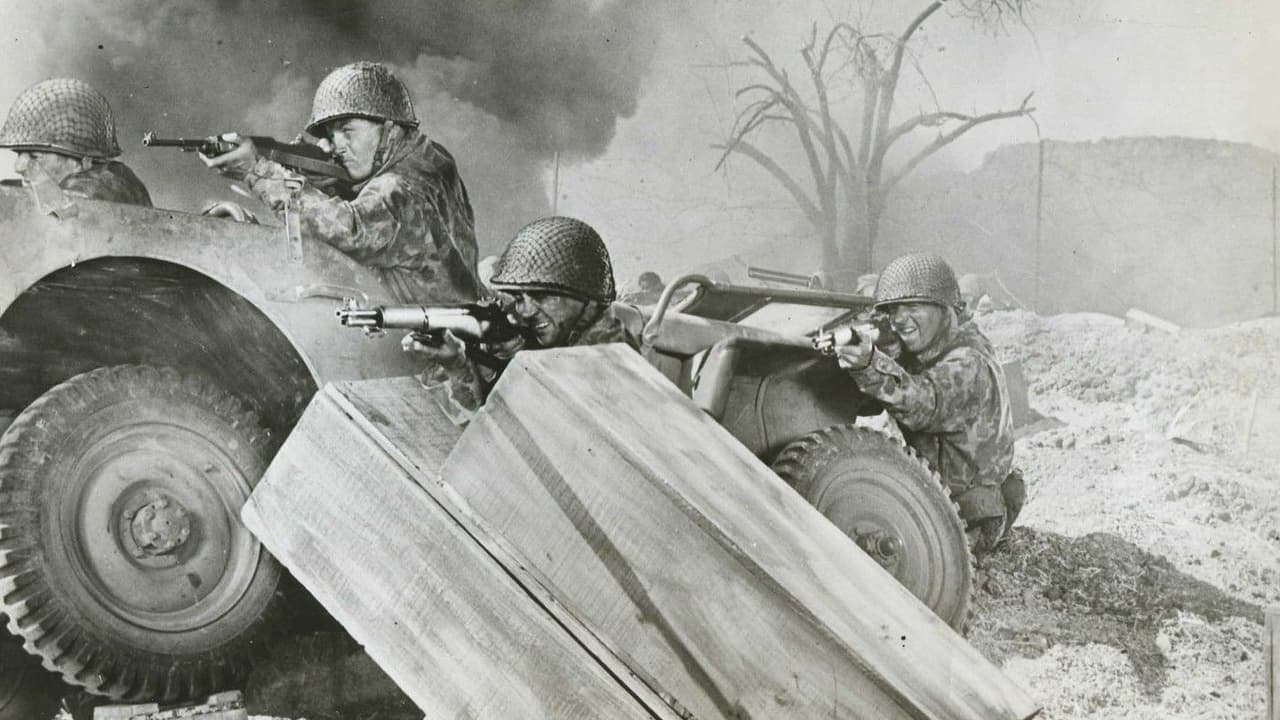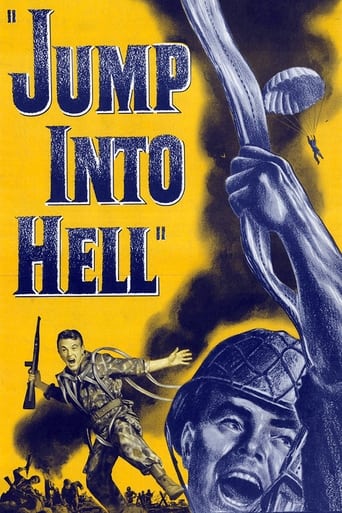

In 1992, The French made "Diên Biên Phu" a movie about the battle. It was their "Apocalypse Now". It's pretty impressive. The only other movie I have seen about the event is "Jump into Hell". However it is anything but impressive, and although there are some facts in there, the filmmakers didn't let them get in the way of the drama.When I was a kid in the 1950s, I used to like this film. At the time it seemed a novel war movie set in an obscure place called Indo-China, and as it didn't involve our guys, it could be viewed with a certain amount of detachment. But of course a few years later it morphed into the Vietnam War and did involve our guys very much indeed.Looking back, the views in the film seem awkward - Russian and Chinese communism is presented as the main reason the French are having such a hard time rather than any nationalistic spirit on the part of the Vietnamese.The look of the film is patchy. Grainy documentary footage is mixed with scenes shot for the film and it isn't seamless. The acting is of the emphatic variety with exposition issuing from all and sundry.The key points of the battle are touched upon: the outgunned and outnumbered garrison; the isolated forts all named after women that fell one by one, and the fact that reinforcements bravely parachuted in.Long after I saw "Jump into Hell", I read Bernard Fall's history of the battle, "Hell in A Very Small Place". It left me with respect for the French soldiers, especially the paratroopers. Jacques (Jack) Sernas plays one of the soldiers who parachutes in along with characters who were Hollywood's version of typical Frenchmen - wine and women being a big focus.A recurring motif is the interaction between the commander, General De Castries (Arnold Moss), and defeatist Major Maurice Bonet (Lawrence Dobkin). Each time the major suggests surrender, instead of popping him against the wall and spraying him with bullets, the general sprays him with high-minded speeches about how they are sacrificing themselves for the freedom of the world. However after a gallant stand, the garrison of Diên Biên Phu did surrender."Jump into Hell" is a hard one to recommend to an audience these days, but it does reveal the mindset of the 1950s and in a way helps explain why the next phase of the war in Vietnam was probably inevitable.
... View MoreOne of the Vietnamese characters, a troop on an airplane, pretty much sums up the overall issue in Indochina: they didn't want outsider Russians and Chinese, nor did they want the outsider French unless the French granted them some autonomy (he used the much-overused phrase "democracy"). Later, the vast majority of them didn't want the outsider Americans, either. After the departure of WWII Japanese occupiers, French Colonialists, anti-communist Americans, Russians and Chinese, and after fighting yet another border war with China after the Americans left, Vietnam finally became a sovereign nation. Whew, what a long slog they had.Many heroic and brave French military and Foreign Legion troops were sacrificed in Indochina and the film properly credits their bravery, with some well done military depictions.The Americans ended up seeming rather two-faced to everyone, having at one time sided with the Vietnamese nationalists during and after WWII only to drop them, later supporting the French because they were anti- communist, only to just simply abandon the French along with any and all representations expressly made or implied to them. I mention this mainly because some one-sided American cold war jingoism is used to an almost laughable extent throughout the movie.Diplomacy is given lip service but actually played an important part in all of the Indochina conflicts. A Geneva conference is mentioned, and in fact a later Geneva Agreement reached by U.S. Ambassador Averill Harriman in 1961/62 effectively ham-stringed subsequent U.S. actions in the region. Constant conferences went on for decades regarding the Indochina situation.The lessons of the conflict depicted in this film should not be forgotten but I believe it is a travesty that the word "Colonialism" is not emphasized in the film or in most reviews and discussions of it. I prefer to remember this film as a jump into Colonialism, which is was.
... View MoreI saw this film many years ago. Perhaps watching Platoon, Firebase Gloria, Go Tell it to The Spartans, Casualties of War brought this film to mind.Jump into Hell often shown in the days of the Big Show, the after school re-run movie in the 1960s takes a look at the early phase of the Viietnam War fought by the French. In 1954 French forces parachuted into western Vietnam to cut off Viet Minh (communist) supply lines from Red China. The move encouraged by a US promise of air support which never materialized put French troops far removed from their supply lines. General Giap the Viet Minh commander perhaps the greatest General of the 20th Century, General Westmorland's comments to the contrary, seized the opportunity and besieged the over-extended French. The result was a French Staligrad, sapping French enthusiasm for further colonial conflict in South East Asia and leading to a negotiated peace.The movie Diên Biên Phu, often titled Jump Into Hell, takes a look at the French disaster at Dien-bien-phu from the French perspective: bravery, personal loyalty and determination leads many French soldiers and Legionnaires to volunteer to reinforce Diên Biên Phu and rescue trapped comrades. There is a good look at the tactics of the Viet Minh and the use of the helicopter in modern warfare, albeit unsuccessfully at Diên Biên Phu.General DeGaulle summed up the American involvement which followed the collapse of the French war effort in Vietnam: "Americans have learned nothing from French blunders."
... View MoreThis is one of the very few films dealing with the the "French" phase of the Vietnam War. It's a medium budget (even though the guns aren't fully authentic) American film with many European actors. It was made at the height of the Cold War, and before the American public became jaded and cynical over our own involvement. Many brave men on both sides sacrificed their lives at Dienbienphu, and most believed deeply in their respective causes. A fair number of rear echelon French troops---including Vietnamese and Foreign Legionnaires (some of them with ugly past lives in the SS) parachuted into the slaughterhouse, even after the situation had become hopeless. Amazingly, some of them had never jumped before! But, despite this truly monumental display of courage, the overly worshipful portrayal of the French is more than a bit over the top.The idea of turning Dienbienphu---surrounded by densely forested mountains----into a super firebase in an area with only one all weather road and an airstrip right under the concealed guns of an unsubdued enemy, was a military blunder of the first rank.Unmentioned in the film is the fact that the French really expected massive U.S. intervention if they got into serious trouble. But, they didn't even get the airstrikes they begged for. The ending is a bit deceptive since it is implied that the French went down fighting to the last man. Although they sustained heavy battle casualties, in actuality they surrendered after running out of ammunition, and thousands of French soldiers and legionnaires went into captivity. Many died of disease and malnutrition.The movie does contain a fair amount of action and the battle scenes are well staged. Strangely enough, some of the best parts deal with the "soap opera" flashbacks of the main characters about their prewar lives. I loved this movie when I was a kid. Although my subsequently acquired knowledge has cooled my enthusiasm in many respects, it is still an interesting historical period piece, and a worthwhile story about bravery and sacrifice.Another one of a rather surprising number of quality films that have never made it to commercial video.
... View More